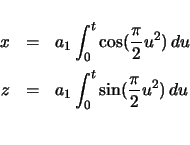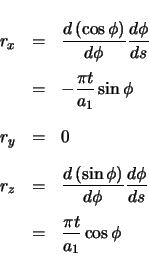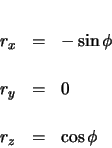



Next: Circular Region:
Up: Joint Elements
Previous: Joint Elements
Contents
The equation for the arclength of a clothoid is used to determine  , the variable used for
clothoid calculations. It is found in the same manner as it is for a loop and corkscrew, except the total arclength, instead of the projection, is used.2.9
, the variable used for
clothoid calculations. It is found in the same manner as it is for a loop and corkscrew, except the total arclength, instead of the projection, is used.2.9
The vertical angle through the joint is defined as the angle between the forward vector and the
 -
- plane. It is determined from the value of
plane. It is determined from the value of  calculated above.
calculated above.
The position of points in clothoid 1 is calculated, initially beginning from horizontal, as shown in
figure 2.11.
If a downward joint is being calculated,  is negated. The clothoid is then rotated
is negated. The clothoid is then rotated  radians about the
radians about the  axis to line it up with adjacent elements. Refer to appendix
B for an explanation of rotation transformations.
axis to line it up with adjacent elements. Refer to appendix
B for an explanation of rotation transformations.
The calculation of the forward and radial vectors is nearly identical to the calculation for the
curve. An abbreviated description will be shown here.
Derivatives with respect to arclength of the position vector must be taken. The required chain
rule relationships are first determined.
The forward vector is calculated by taking the derivative of the position vector (with respect to
arclength) as it was first calculated. It will then be transformed in the same way as the position
vector was.
The  coordinate is negated if a downward joint is being calculated. The vector is then rotated
coordinate is negated if a downward joint is being calculated. The vector is then rotated  radians about the
radians about the  axis.
axis.
The radial vector is calculated as the derivative of the forward vector (with respect to arclength)
as it was initially calculated.
The unit vector in the direction of the radial vector must be determined.
The  coordinate is negated if a downward joint is being calculated. The vector is then rotated
coordinate is negated if a downward joint is being calculated. The vector is then rotated
 radians about the
radians about the  axis. The result will still be a unit vector, as rotation does not
alter magnitude.
axis. The result will still be a unit vector, as rotation does not
alter magnitude.
The curvature is the magnitude of the (non-unit) radial vector.
 |
(2.126) |
2.9
Since the joint is a two-dimensional curve, the projection is the same as the total arclength.




Next: Circular Region:
Up: Joint Elements
Previous: Joint Elements
Contents
Darla Weiss
2000-02-13





![\begin{eqnarray*}
f_{x} & = & \ensuremath \frac{d\left[ a_{1} \ensuremath\int_{...
...)\,du \right]}{dt} \ensuremath \frac{dt}{ds} \\
& = & \sin\phi
\end{eqnarray*}](img308.gif)


